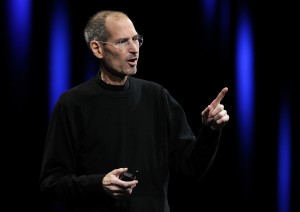So what's giving rise to gloomy comments like this one from "author investor" Carol Roth on Yahoo Finance:
There is a point in time when these companies become too big to succeed. Apple now is twice Microsoft's size, approximately, and I think it's running into the same issues; it's very hard to get that huge growth when you are so large.
But Apple is not too big, said Neil Hughes, senior editor at Apple Insider. What may be over-sized were analysts' expectations.
"Part of it is that Apple had this unheard of growth," Hughes told Shuler. "It was start-up-like growth for a 30-year-old company ... Investors are realizing that it can’t last forever ... But they still have $120 billion in cash and investments, they are still selling more product than ever before, so a lot of those concerns are unfounded."
Technorati may be contributing to the aura of gloom about Apple, said Sarah Rotman Epps of Forrester Research.
"There is also a misunderstanding of Apple’s product line and who they’re innovating for," she said. "A lot of the first customers were tech optimists or early adopters who may feel disappointed about where Apple is today. They’re not interested in tech innovating just for the sake of innovation … Instead they’re interested in bringing up their entire ecosystem together and maintaining a relatively high level ... of service ... They’re interested in quality, not innovation for innovation’s sake."
Richard Doherty, an analyst at Envisioneering Group pointed out the company has some less tangible assets. His team has been talking to costumers has made Doherty optimistic about Apple's prospects.
"We’ve heard of people wearing out Apple screens," he said. "You talk to anybody who has an iPhone, an iPod or an iPad those products get a lot of use."
Likewise, he said, having Apple on your resume pretty much guarantees great job offers.
"From what we’re aware of [Apple has] less turnover than most companies in the Fortune 500, let alone Silicon Valley."
At trade shows, too, everyone seems to have their eyes fixed on Apple's booth, he said.
The company also has an asset no one else can claim: Steve Jobs. Although the company's brilliant co-founder died in October 2011, his imprint remains on most products in its pipeline. "So the real test of Tim Cooke or whoever comes next wont be this year but five years from now," said Epps.
Despite these fundamental strengths, Apple will have to come up with something new and exciting, Epps said.
If you look at the markets they’re in, MP3 players is a declining market. PC’s is a declining market. Tablets is a maturing market and Apple still has a majority share of it and I think they’re doing very very well with the iPad line. Smart phones is a growing market and Apple has to fight for it... They’re fighting Samsung, they’re fighting the the Android ecosystem, they’re fighting lower price-point phones. So even in the best-case scenario, Apple can’t sustain tremendous growth unless they enter brand-new markets... They noted that they are still in the market of rolling out iPhone 5’s to more carriers around the world. They are launching in new countries, both the hardware and the software. Apple is hoping that more carriers will stimulate growth but they also need new products to attract new customers, to attract new growth.
For the time being, though, these experts think Apple's still a good buy. Doherty gave it the best recommendation an analysts can give: "I don’t own stock in the companies we’ve been talking about today; as an analyst I’m not allowed to. But if I could I would own Apple in a heartbeat."
